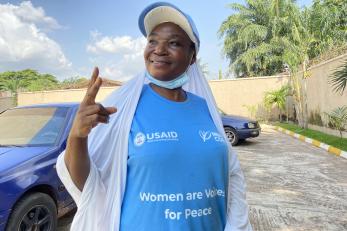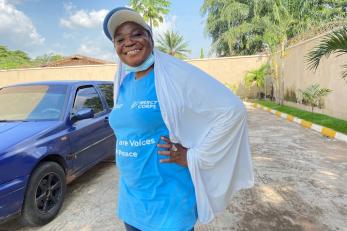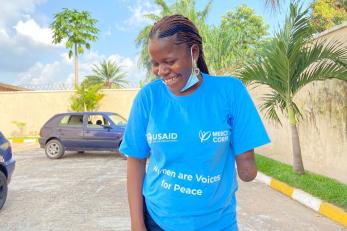Benue women leverage VSLA to promote women’s involvement in peacebuilding

Hajiya Hauwa Isah is a member of the Makurdi LGA Women Peacebuilding Council (WPC), the State Chairperson of the Women Wing Jama’atu Nasril Islam (JNI), and a member of the Muslim community in Makurdi LGA, Benue state. As a member of the Benue state WPC, which was inaugurated in 2020, Hajiya Hauwa sought to identify ways to support women in her community to be self-sufficient while sharing skills and lessons learned from Mercy Corps Community Initiative to Promote Peace (CIPP) supported capacity building.
“There were no resources in the community and women were idle and having a lot of issues in their homes, so we started a Village Savings and Loan Association (VSLA) group in Wadata and North Bank communities in Makurdi LGA” said Hajiya Hauwa. According to Hauwa, the VSLA started with one group of 25 – 30 members and has now expanded to 25 groups in Wadata and five groups in North Bank. “Women in the community are now becoming self-sufficient. With the money they save from the VSLA, they are now more independent and can afford to send their children back to school or cater to other needs. This is very important because it reduces the level of domestic violence and early child marriage in the community. The men even appreciated the initiative so much they went to form their own group too,” she said.

The VSLA groups go beyond being a tool for economic empowerment as the meetings are also used for capacity building and knowledge sharing on key peacebuilding skills that the women learn from their WPC activities and other training such as the Interest-Based Negotiation and Mediation (IBN+M). From these step-down training, a group of 50 women have been trained in key peacebuilding skills and now resolve conflicts that come up in the community. “We work in collaboration with major stakeholders including the police and civil Defense Corps. The desk officer at the headquarters is very responsive to us whenever we report cases, especially GBV related cases,” said Hauwa. The women are now known in the community as the go-to people for handling conflict cases in their communities.
“Mercy Corps has done a good job in making sure women own this (WPC) process because we will sustain this initiative even when Mercy Corps leaves. Whenever we attend training, we come back and teach the lessons to the women in the group,” said Hauwa. Hauwa and the WPC hope to scale up their activities to extend their reach to other women in their communities.
CIPP WPC providing representation for women with disabilities
Representation matters. According to Faith Yassa, a young woman with disability and a member of the Guma Local Government Area Women Peacebuilding Council (WPC) in Benue state, her membership in the WPC has improved her approach to conflict situations and provided much needed representation for people with disabilities in peace processes.
“Being a member of the WPC has helped women with disabilities because I serve as a representative for the needs of women and people with disabilities. Whenever we attend trainings, meetings, or dialogues, I make a special case for these women to ensure that when decisions are taken, our interests are considered. When it comes to issues like accessibility, when they are unable to gain access to these activities’ locations, they feel left out and might go as far as instigating trouble,” said Faith.

Things are different now, according to Faith, “Women with disabilities have been able to make a change, showing us a better way to resolve conflicts, even with those who display bias and discrimination against us. In the past, when you discriminate against a woman with disability, she fights you back, sometimes even physically but now they dialogue and give reasons for why you shouldn’t use certain words in reference to us”. “I used to be a fighter, whenever people called me names, I would fight them. But after a mediation training that I attended in Gbajimba Guma LGA, we were taught how to negotiate, dialogue, and settle conflict. After the training I approached some women that I had issues with, I made peace with them, and apologized for my past behavior.
Since joining the council, Faith has also improved her skills in resolving conflicts and has successfully resolved familial and land disputes in her community. “There was a conflict between my two brothers and their wives that I was able to resolve. My younger brother slapped the older brother’s wife, and such an act is a taboo in Tiv culture and could have led to serious consequences for him and escalation of violence in the community. I was able to resolve the issue between them without anyone finding out. I also resolved a conflict between my uncle and some people who were fighting over a piece of land. The land was sold to my uncle years ago, but the sellers came back to drag and ask for more money because they felt the money that was initially paid was too small. I was able to reason with them to see that there is a better way to approach the matter and I was able to resolve the issue amicably.”
According to Faith, accessibility is a big problem in the disability community. Many people with disabilities are unable to participate in NGO supported interventions and as a result they become upset, arrogant and might even instigate trouble. Faith believes that a lot more can be done and highlighted the importance of addressing the root causes of conflicts which are poverty, lack of education, exclusion, and lack of economic empowerment with the hope to support the community to address these issues and in turn, reduce conflicts.
About the Women Peace Council
The Women Peacebuilding Council (WPC) is a group of women chosen from the LGA and state level who are leaders (including youth and women living with disabilities) from diverse backgrounds, traditional and religious institutions, ethnic groups, civil society, academia, government MDAs, the media, etc. The council will focus on elevating the unique role of women in conflict prevention and peacebuilding through the development and implementation of gender responsive peacebuilding initiatives. The council is a forum for women to identify conflict prevention and mitigation needs and strategies in a supportive environment and serving as a brain trust to inform community actions and women-led initiatives.